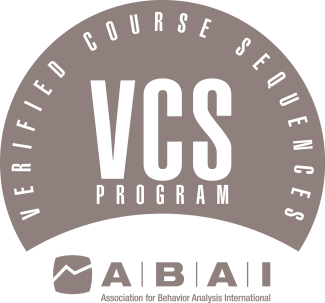For those on Funded Grants, additional coursework may be required.
*The Association for Behavior Analysis International has verified the following courses toward the 5th edition coursework requirements for eligibility to take the Board Certified Behavior Analyst® or Board Certified Assistant Behavior Analyst® examination. Applicants will need to meet additional requirements before they can be deemed eligible to take the examination.
| Semester | M.S. ABA | Certificate Fast-track | Certificate Regular Track |
|---|---|---|---|
| FALL I |
|
|
|
| SPRING I |
|
|
|
| FALL II |
|
|
|
| SPRING II |
|
|
|
| FALL III |
|

